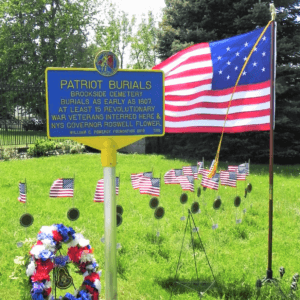Patriot Burials® Marker Grant Program
What is a Patriot?

Service must have been carried out, with some exceptions, on or between April 19, 1775 and November 26, 1783.
One or more of the following criteria must be met:
-
- Served in a branch of the military, including Continental Army, Continental Navy, Minutemen, and militia on or between 19 April 1775 and 26 November 1783; served at the Battle of Point Pleasant on 10 October 1774 (this location and date only); or furnished a substitute for military service.
- Defended a fort, frontier or served as a ranger
- Taken as a prisoner of war, including those on the British ship Old Jersey or other prison ships
- Signed the Declaration of Independence, Mecklenburg Declaration of 1775, Albemarle Declaration of 1779, or Cumberland Compact of 1780
- Member of any of the Continental Congresses
- Participated in the Boston Tea Party, Kaskaskia Campaign, Galvez Expedition, Cherokee Expedition, or Edenton Tea Party
- Physician, surgeon, nurse, or otherwise rendered aid to wounded of the Continental Forces
- Rendered material aid, such as furnishing supplies with or without remuneration, lending money to the Colonies, munitions makers, gunsmiths, or any other material aid which furthered the cause of American Independence
- Rendered civil service to the Colonies under the authority of a provisional or new state government such as state official, county or town clerk, judge, sheriff, selectman or justice of the peace
- Served as a member of committees made necessary by the violation of colonial rights by England or the War, such as committees of safety, observation, inspection, and correspondence
- Pledged to support the cause of the Colonies, by the Oath of Fidelity and Support, Oath of Allegiance, Articles of Association, or Association Test
- Signed a petition addressed to and recognizing the authority of the provisional and new state governments
- Accepted obligations or acted under direction of the provisional and new state governments, such as persons directed to hold elections, to oversee road construction, to collect provisions, or similar responsibilities
- Clergy member or other recognized leader of any religion who performed overt acts of resistance to the authority of Great Britain which could only be performed by religious leaders
Please note that the Pomeroy Foundation trustees reserve the right of final determination as to whether proof of criteria has been met.
Do you need to save or print this information?
Access and download a PDF copy of the definition and criteria list by clicking here.
